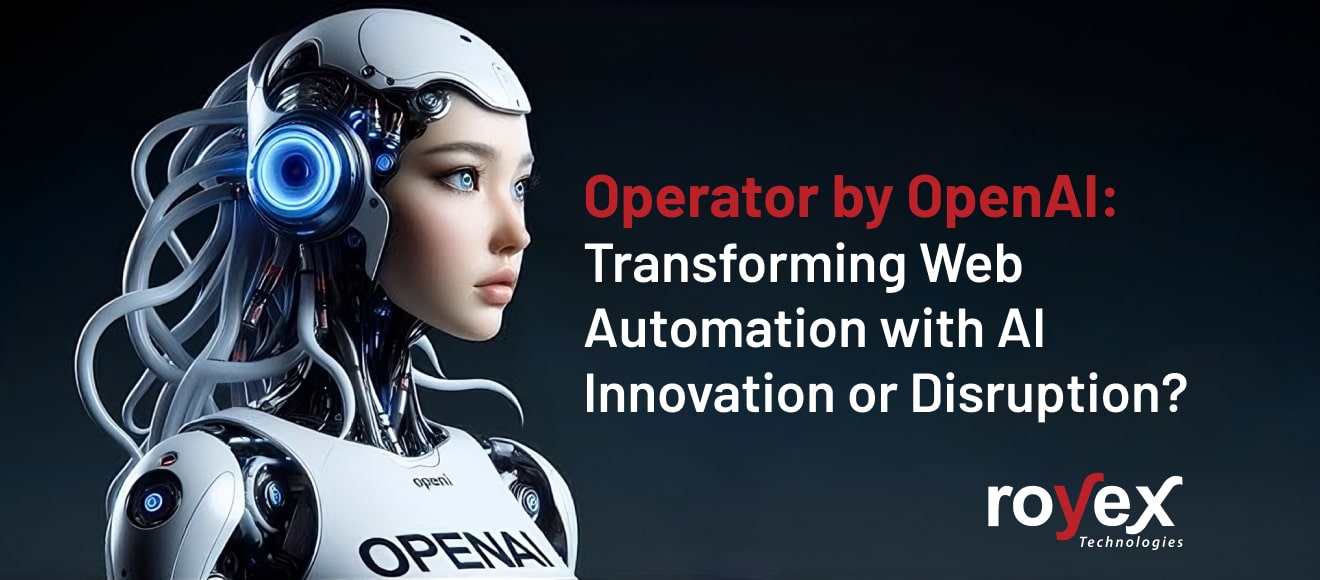
Operator by OpenAI: Transforming Web Automation with AI—Innovation or Disruption?
OpenAI never misses a chance to amaze you, and once again, it has taken a bold step into the future with its latest innovation. On January 23, 2025, OpenAI unveiled its latest innovation, Operator—a groundbreaking AI agent designed to perform complex tasks on the web autonomously. As a research preview, Operator combines advanced AI capabilities with human-like interactions, marking a significant leap forward in AI-driven automation.
OpenAI’s latest announcement is an important step as the company works towards the potential future of artificial general intelligence (AGI). AGI is a term used to describe AI that is as smart as, or even smarter than, humans in many different areas or tasks. While AGI sounds like a big goal, it is not clearly defined, and experts have different opinions on whether it is possible to create.
What is Operator And How Does It Work?
Operator is an advanced AI agent created by OpenAI to act as a personal assistant for online tasks. Unlike traditional chatbots that respond to user queries, Operator can actively interact with websites, navigate through them, and complete tasks without human intervention. For example, it can fill out forms, make purchases, manage travel bookings, and much more. The tool works by combining OpenAI’s GPT-4 model with computer vision, allowing it to understand and interact with visual elements on the web.
This means that Operator can do tasks that involve navigating complex websites, something that would normally require human attention. It simplifies interactions with web-based tools and services, making it easier to accomplish tasks that typically take up valuable time.
Operator is powered by OpenAI’s cutting-edge Computer-Using Agent (CUA) model, an integration of GPT-4o's visual reasoning abilities and sophisticated decision-making algorithms trained via reinforcement learning. This blend allows the AI agent to analyze graphical user interfaces (GUIs), understand screenshots, and execute actions such as clicking, scrolling, and typing.
OpenAI has partnered with companies such as DoorDash, Instacart, OpenTable, Priceline, and Uber to enhance Operator's functionality, allowing it to handle tasks like making restaurant reservations or ordering food deliveries. The tool is designed with security measures, prompting users for permission when encountering sensitive data or performing high-stakes tasks.
How to Use Operator
Currently, Operator is available to ChatGPT Pro subscribers in the United States. Users can access it through a web application, where they can input tasks for the AI to perform. Operator will then execute these tasks by interacting with web pages as a human would, ensuring tasks are completed accurately and efficiently. OpenAI plans to expand its availability to a broader audience in the future, aiming to make this innovative tool accessible to more users worldwide.
The Benefits of Operator
One of the main advantages of Operator is its ability to enhance efficiency. It can handle repetitive tasks much faster than a human, freeing up employees to focus on more strategic and creative work. Additionally, it ensures a high level of accuracy, as AI doesn’t suffer from fatigue or make errors due to oversight. This makes it ideal for tasks such as data entry, report generation, and other detail-oriented processes. Furthermore, the cost-saving potential is significant, as businesses can reduce their reliance on manual labor. Operator’s user-friendly design, which includes natural language capabilities, also makes web automation accessible to people without technical expertise, broadening its appeal.
AI and Ethics: Where To Set Limits?

While Operator offers many benefits, it also raises some serious ethical questions. These concerns need to be addressed to ensure that AI tools like Operator are used responsibly.
Job Losses
One of the main concerns is that automation could replace jobs. For example, tasks like data entry or customer service may no longer require as many people if AI can do the same work. This could make it hard for some workers to find new opportunities, especially if they do not have the skills to adapt.
Privacy and Security
Operator works by interacting with websites and collecting information. This could lead to problems if it accesses personal or sensitive data without permission. Companies need to ensure that the tool is used within the boundaries of privacy laws and ethical practices.
Misuse of Technology
Like any tool, Operator can be used for good or bad purposes. It could be misused to gather data illegally or send spam. To prevent this, strict rules and guidelines must be in place.
Bias in AI
AI systems learn from data, but sometimes the data can be biased. This means that the AI might make unfair decisions or treat certain groups of people differently. Developers and companies must work hard to reduce bias and make AI systems fair for everyone.
To address these concerns, businesses, governments, and developers must work together to create rules and safeguards that encourage responsible use of AI tools like Operator.
The Potential Impact of Operator
The impact of Operator largely depends on how it is used. When used properly, it has the potential to transform industries by making operations more efficient, accurate, and productive. For example, in e-commerce, Operator can automate tasks like managing inventory and interacting with customers, helping businesses run more smoothly. In healthcare, it could simplify processes like scheduling appointments and managing data, allowing doctors and nurses to spend more time caring for patients. In education, it can take care of administrative duties, giving teachers more time to focus on teaching and interacting with their students.
However, if not used responsibly, Operator could raise serious ethical concerns, lead to job losses, and even be misused for harmful purposes. For instance, it could be used to spread misinformation or disrupt industries in negative ways. Therefore, it is crucial to find a balance between innovation and responsibility. By ensuring that the tool is used ethically and safely, we can maximize its benefits while minimizing potential risks.
The Way Forward
To make the most of Operator while reducing its potential downsides, it’s important for everyone involved to work together. Businesses must adopt ethical practices by being open and fair when using automation tools like Operator. Policymakers have a key role in creating rules that protect workers from losing jobs to automation and ensure that technologies like Operator are used responsibly. At the same time, developers need to focus on security and ethics when creating and launching these tools, ensuring that there are protections in place to reduce risks.
It’s also important that these collaborations are not only focused on technology but also consider the people affected by it. For example, training programs could be offered to help workers learn new skills as AI continues to evolve, reducing job displacement. By taking a balanced and thoughtful approach, we can unlock the full potential of AI tools like Operator while making sure they benefit everyone.
Conclusion: Is Operator the Future or Just a Fad?
The Operator represents a significant leap forward in AI technology, bringing us closer to fully automating our online tasks. However, it raises an important question: Are we truly prepared to trust artificial intelligence with handling our daily online activities?
What’s clear is that if OpenAI can deliver on its promises, the Operator has the potential to become an invaluable digital assistant. It could save users considerable time and effort by taking care of routine online tasks like managing emails, setting reminders, or planning schedules. The idea of an AI handling these tasks could make life much more efficient, especially for busy professionals or anyone looking to reduce stress.
That said, there are still concerns. The more we depend on AI, the greater the risks, such as privacy issues or the possibility of AI making decisions we might not agree with. After all, even something as simple as ordering a pizza could turn into a surprising mishap if the AI picks the wrong toppings. It’s all about finding the right balance between convenience and control.





